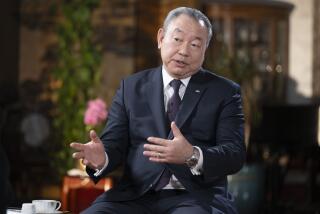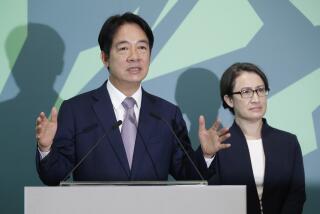New U.S. Ambassador Assumes Post in China
BEIJING — As military tensions continue to mount between China and Taiwan, new U.S. Ambassador James R. Sasser on Wednesday formally presented his credentials to China’s President Jiang Zemin, ending an awkward eight-month period in which the United States had no ambassador to the world’s most populous country.
The former Democratic senator from Tennessee, who has been taking cram courses in Mandarin Chinese, will be tested immediately by the continuing fragility of the U.S.-Chinese relationship.
Several members of Congress have urged an investigation into China’s sale to Pakistan of technology that could be used in making nuclear weapons. Later this month, the Chinese army is expected to begin massive military maneuvers designed to intimidate Taiwan. And on March 23, Taiwan will hold its first direct presidential election, which will be covered around the world and invite invidious comparisons with China.
Sasser, who served 18 years in the Senate before losing his reelection bid in 1994, brings little China experience to the job. But in a statement released after the accreditation ceremony at the Great Hall of the People here, he pledged to use his Senate background to help China get along better with Congress, where criticism of China’s human rights record is intense.
“The Chinese government recently expressed its belief that it needs to work more closely with the U.S. Congress,” Sasser said. “I welcome this evaluation. I hope I can contribute to a deeper mutual understanding of each other’s views and the values that shape our respective positions on many issues.”
Sasser’s accreditation as the sixth U.S. ambassador to China since the establishment of diplomatic relations in 1979 represents a significant step toward repairing relations damaged last year when China reacted angrily to a U.S. visit by Taiwanese President Lee Teng-hui.
However, as recent military maneuverings in the Taiwan Strait attest, the furor over Lee’s June trip to an alumni gathering at Cornell University in upstate New York has not abated.
The Taiwanese-born Lee, 73--an overwhelming favorite to win next month’s presidential election--leads the ruling Nationalist Party, which supports the eventual reunification of Taiwan and the Chinese mainland. But he has made enemies in the Beijing regime by seeking a seat for Taiwan in the United Nations along with other forms of diplomatic recognition for an independent Taiwan.
Sometime later this month, the Chinese People’s Liberation Army is expected to engage in military maneuvers in coastal Fujian province aimed at intimidating the Taiwanese electorate and discouraging Lee from taking a strong pro-independence stand following his anticipated election.
Some foreign military analysts have even speculated that China will launch an attack on outlying Taiwanese territories, such as the disputed islands of Matsu and Quemoy. Others believe China will fire off test rounds of M-11 or M-9 missiles, as it did last fall before Taiwanese legislative elections.
“We know they are going to do something. We just don’t know how big it is going to be,” said a Western diplomat in Beijing. “Our view is that it will mainly be a psychological-warfare thing aimed at influencing the elections.”
Taiwan on Monday raised the alert level of its troops.
In his confirmation hearings before the Senate Foreign Relations Committee, Sasser, 59, said he planned to stress the economic ties between the U.S. and Beijing.
“I see that as one of the top priorities of the embassy [in China] . . . to work to expand U.S. commercial interests in China and to see that U.S. business gets access to this Chinese market of 1.2 billion people,” he said.
But Sasser, whose appointment was held up by Senate Foreign Relations Committee Chairman Jesse Helms (R-N.C.) because of a fight over reorganization of the State Department, is viewed warily by Chinese who remember his Senate votes against most-favored-nation trading status for China because of concerns over human rights conditions here.
In his confirmation hearings, Sasser said he had since changed his views on using trade sanctions to make political points with China.
“I became less and less convinced that was really a wise policy,” he said.
More to Read
Sign up for Essential California
The most important California stories and recommendations in your inbox every morning.
You may occasionally receive promotional content from the Los Angeles Times.









